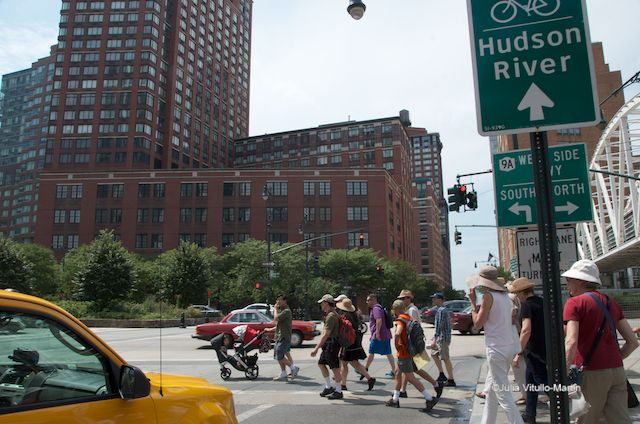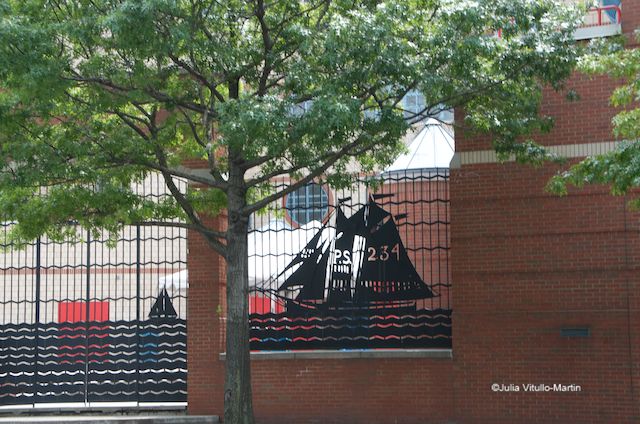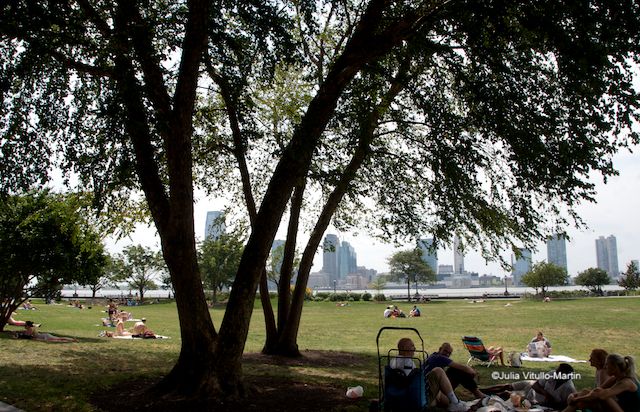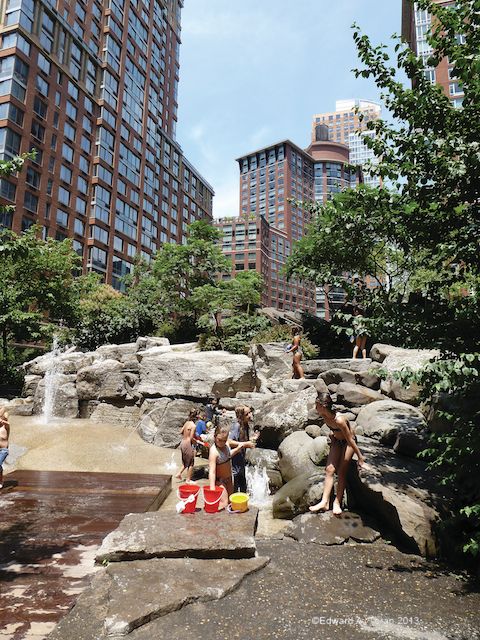

“The original Battery Park City design was about as banal as could be imagined—bland modernist towers in a Corbusian park-like setting,” architecture critic Francis Morrone is saying to his audience of some 25 attentive New Yorkers, who’ve signed up for one of his renowned Municipal Art Society tours. “Fate in the form of the 1975 fiscal crisis saved us, decreeing this could not be built. By the time it started up again, a whole new generation of architects—Young Turks—had replaced the old.” How lucky for New York, because the Battery Park City we’re about to see with Morrone is by universal assent superior to what would have been.

Travel and Leisure named Morrone one of the ten best guides in the world. Scholarly, charming, funny, and efficient, he rounds us up and directs us to march across Chambers towards the Hudson, with the intention of walking the full-length of the waterfront down to the Battery.
This tour is especially well-timed, because the Norton Architecture & Design series has just published A Guide to New York City Urban Landscapes, co-authored by Robin Lynn and Morrone, with photos by Edward A. Toran. The book covers the five boroughs, but begins the way New York itself began, at the water’s edge. So do we, on the recent tour. Here are a few stops that were surprising even to the highly knowledgeable and seriously demanding MAS crowd.
Teardrop Park

Heading towards the water, we walk briskly through the relatively open Nelson A. Rockefeller Park, which has a great deal of “active recreation,” as opposed to the contemplation promoted by Olmsted and Vaux in Central Park. We pause at The Pavilion whose “proportions and details,” says Morrone, make it the most perfect thing of its kind since Stanford White’s 1904 peristyle in Prospect Park. Gesturing towards the surrounding landscape, Morrone notes that it pioneered what is now the dominant form of urban landscape–wild grasses and blanketing perennials.

When we reach Teardrop Park, most of us look around in hopes of spotting the actual park. Maestro that he is, Morrone waits quietly, before announcing, “You are about to enter a Hall of Shame.” The Project for Public Spaces has so designated Teardrop, calling it a “$17 million public park that serves primarily as a private courtyard arboretum to the surrounding high-rise development.” PPS admonishes that the “decidedly private” Teardrop “is not a park that you go to to participate constructively in public.”
But do we all have to participate constructively all the time? Can’t we sometimes try Olmsted and Vaux’s contemplation instead? Teardrop’s tiny two-acre space bordered by towering apartment buildings is certainly a lovely refuge for reading and thinking. What’s more, children clearly adore its slide and cascading water. Morrone, who especially likes its dramatically shifting sight-lines and lush vegetation, finds nothing objectionable about Teardrop’s return to an old idea–the park as a retreat from the city.
The World Financial Center’s Winter Garden
Next, we stop at the Irish Hunger Memorial. Classicist that Morrone is, he seems to admire it intellectually (“a memorial in the form of a landscape”) while not embracing it emotionally. “Everything you see is literal,” he notes–sixty-two species of plants and grasses, as well as stones, from Ireland’s thirty-two counties. “Nothing is metaphorical.”
We make our way down the open esplanade, walking by the North Cove’s yacht-filled marina. Morrone discusses the 3.5-acre World Financial Plaza, which he admires for its “utterly relaxed quality.” He gestures towards an elegant metal fence, which displays rather defiant quotations from his two favorite poets, Walt Whitman (“mettlesome, mad, extravagant city!”) and Frank O’Hara (“I can’t even enjoy a blade of grass unless I know there’s a subway handy.”).
We enter the cool, totally over-the-top palm-filled Winter Garden, whose space roughly equals that of Grand Central Terminal‘s main concourse. The huge glass shell allows in tremendous sunlight for the sixteen 45-foot-tall Washingtonia robusta palm trees from Florida, which, despite the light, must be regularly replaced. Utterly destroyed by the 9/11 attacks, the Winter Garden was completely rebuilt with astonishing speed by its owner Brookfield Properties, reopening in 2002. A quiet triumph for New York, its grand staircase leads to a viewing platform that overlooks the World Trade Center site.
So Much More
There’s so much more, of course, both on the tour and in A Guide to New York City Urban Landscapes , which gallops exuberantly through the five boroughs of New York. One of my favorite little-known sites is the Brooklyn Grange, at 37-18 Northern Boulevard in Queens. Not only can you see Manhattan in the distance, but the Grange’s use of the immense 2.5-acre roof as an organic garden is significant both ecologically and architecturally.
Manhattan’s constant search for more intensive land use has inevitably moved upwards. And now Queens and Brooklyn are moving upward as well, but in their own way, converting once-vacant roofs to productive uses. Co-author Robin Lynn writes that “plants and soil catch and absorb rainwater, so there is less runoff into the city’s sewer system, and less heat is reflected off the roofs.” He also provides a brief history of green roofs, starting with Rockefeller Center in the 1930s.
My other favorite less well-known site–the 478-acre Green-Wood Cemetery–is featured on the book’s cover, and is its oldest open space, having been established in 1838. Green-Wood president Richard Moylan urges New Yorkers to come meander through the grounds, taking in panoramic views of Manhattan, New York Harbor, the Statue of Liberty, and the hills of New Jersey. He concludes by exhorting: “Now get outside and renew your spirit.” Which is pretty much the motto of the book.
Julia Vitullo-Martin is a Senior Fellow at Regional Plan Association and director of the Center for Urban Innovation. Get in touch with her @JuliaManhattan.
A Guide to New York City Urban Landscapes is available on Amazon. Read more about NYC’s green roofs, blue roofs and cool roofs.

